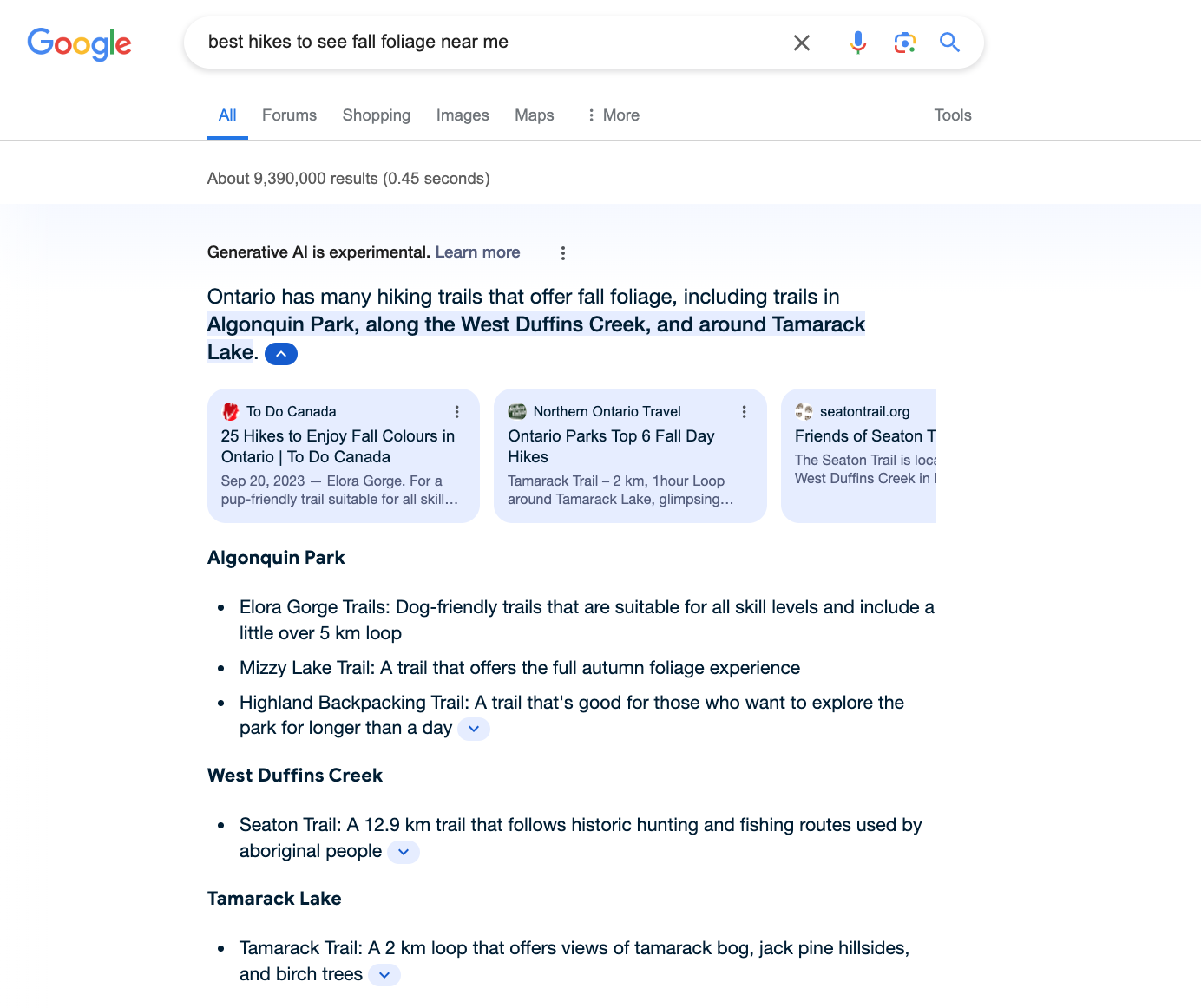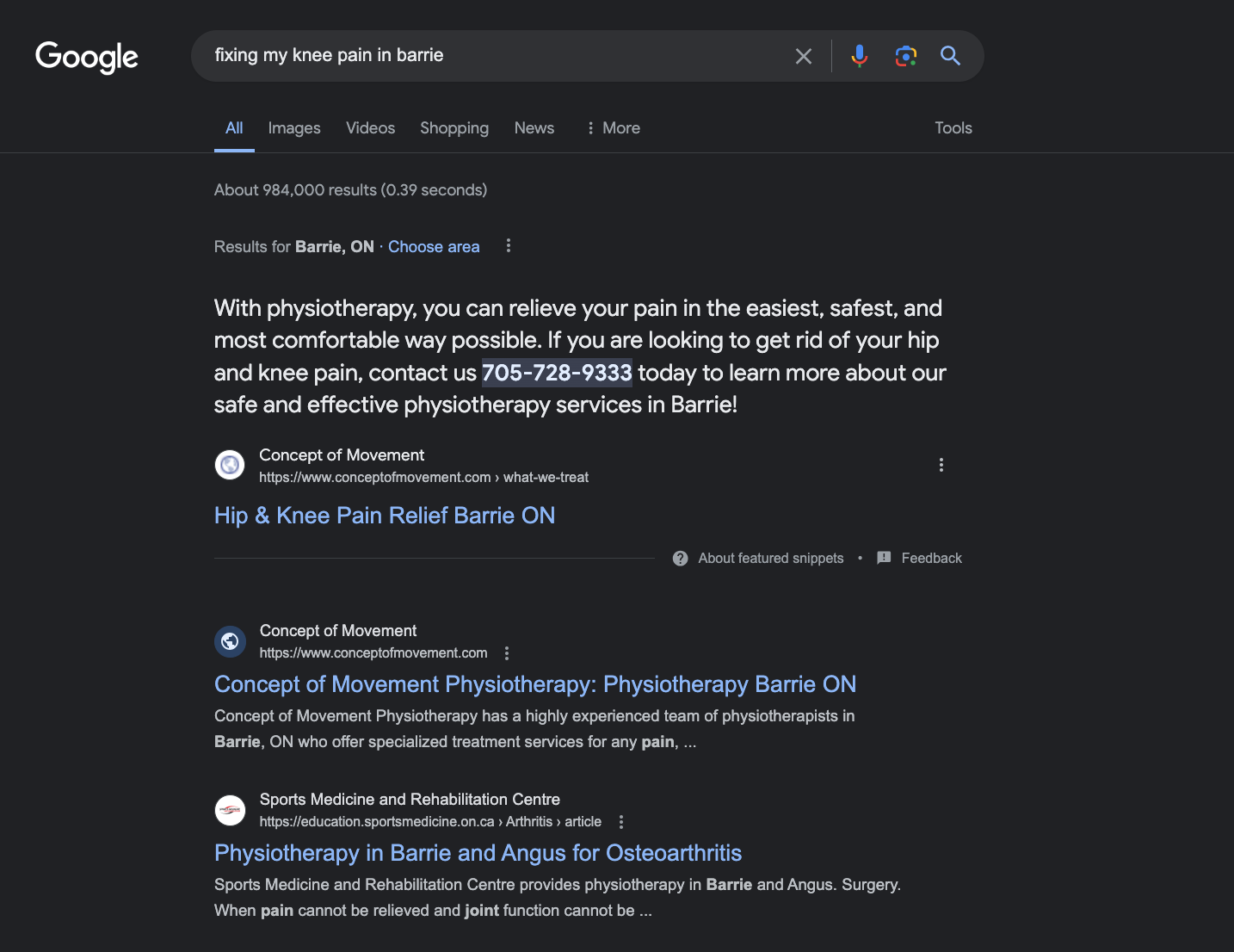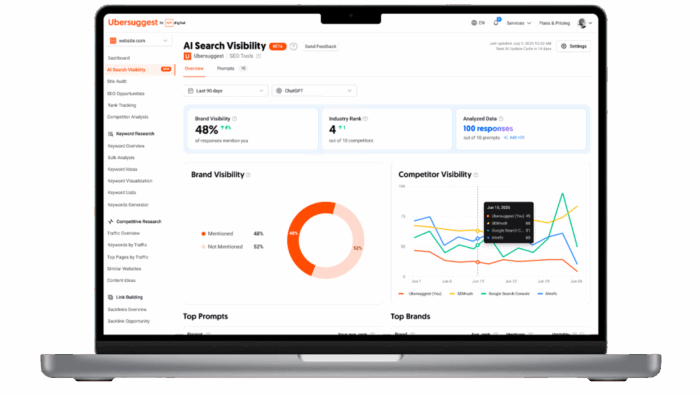How Search Generative Experience Will Affect Local SEO & Businesses via @sejournal, @JRiddall
Discover how to adapt your local SEO strategies for Google's Search Generative Experience (SGE) and increase visibility for your business. The post How Search Generative Experience Will Affect Local SEO & Businesses appeared first on Search Engine Journal.

If you own a local business, it’s quickly becoming imperative to understand Google’s new Search Generative Experience (SGE) and how to adjust your local SEO strategies to maintain and even enhance your presence for optimal visibility, traffic, and revenue.
The good news is if your business has been employing local SEO and content marketing best practices all along, you are well-positioned to adjust to this evolution of search.
AI is rapidly changing how much of the digital world works.
Search engines are also evolving in how they work and deliver results to searchers.
SGE, while still experimental and currently available in 120 countries via Google Labs, is likely going to transform the way people interact with search results by pulling those results directly into Google, providing a more interactive search experience with follow-up content and link suggestions.
In many cases, this may negate the need for searchers to click through to websites at all.
SGE uses a variety of AI-based technologies, including natural language processing, machine learning, and deep learning.
These technologies enable the search engine to understand a user’s search query, process relevant content, and formulate an appropriate response.
Understanding SGE: Beyond Just Links
Traditional search engine results typically provide a list of links relevant to a searcher’s query, where the searcher may need to investigate further to find the optimal answer to their question.
The goal of Search Generative Experience is to go several steps further. Powered by advanced artificial intelligence and language models, SGE aims to:
Synthesize, not just curate information: SGE doesn’t just find relevant websites. It analyzes the content on web pages, extracting specific facts, figures, and insights in order to present a concise, informative answer directly within the search results. As such, SGE is more likely to come into play for searches with informational, rather than navigation or commercial, intent. Understand nuances: SGE aims to better interpret the intent behind a user’s search. Instead of only focusing on keywords, it will try to grasp the reason for the question. This means local businesses must focus on solving problems, not just selling services or products. Provide multi-faceted answers: Sometimes, a simple, single answer to a question isn’t sufficient, and SGE provides opportunities for searchers to ask follow-up questions and/or dig deeper for complete answers. If you’re in an industry or niche with divergent approaches, ensure your content is comprehensive enough to be considered and included. Be creative (sometimes): In select cases, SGE can even generate its own suggestions or solutions to a problem. While not the norm, this demonstrates the shift towards search engines becoming more proactive problem-solvers. This is also one of the known hazards of AI, as it can be prone to “hallucinations” in its attempts to provide answers.From a local search perspective, SGE looks to enhance experience via a Places module, which replicates a local pack in traditional results, including citations, reviews, and other pertinent local business details.
A recent BrightEdge study found nearly half of SGE results generated in February 2024 included a Places module, with local restaurant and travel queries being the most prominent, while it did not show up in other B2B and entertainment-related queries.
Illustrating SGE
Let’s clarify SGE’s approach with an example. Imagine a consumer searching for “best hikes to see fall foliage near me.” SGE might do the following:
Locate: Access real-time location data and understand “near me.” Gather information: Scan hiking websites, hiking or outdoor adventure blogs, local park authority pages, etc., focused on the user’s region. Prioritize “fall”: Identify content within those sources specifically discussing fall foliage, not just general hiking information. Potential response: Display a short list of suggested hiking trails, their difficulty level, estimated foliage peak dates pulled from websites, images sourced from relevant pages, and maybe relevant hiking guide services.Herein lies an opportunity for a local provider of hiking-related services or products to appear within the results for such a query; provided they have relevant, experience-backed, trustworthy, helpful content for Google to reference.
For reference, here’s an actual result SGE provided for this search:
 Screenshot from search for [best hikes to see fall foliage near me], Google, March 2024
Screenshot from search for [best hikes to see fall foliage near me], Google, March 2024
SGE’s Impact On Local Search
How are local search results pages (SERPs) changing with SGE? Here’s what we’ve seen so far:
Google Business Profile is King: With organic website traffic potentially decreasing, high-performing Google Business Profiles (GBP) with updated information, strong reviews, and relevant content will become even more critical for visibility. Evolving Map Packs: While traditional local Map Packs will remain important, as noted SGE includes a Places module depending on the type of search being conducted. SGE may incorporate information from businesses featured in the Map Pack, but also include additional businesses to provide even more comprehensive and helpful answers to a user’s query. Featured Snippets matter: Businesses with content optimized to be concise, accurate, and directly answerable to queries are poised to dominate Featured Snippets. Screenshot from search for [fixing my knee pain in Barrie], Google, March 2024
Screenshot from search for [fixing my knee pain in Barrie], Google, March 2024
Key Strategies For Local Businesses To Thrive With SGE
Businesses need to focus on managing their web presence, providing helpful, relevant content, demonstrating Experience, Expertise, Authoritativeness, and Trustworthiness (E-E-A-T), and optimizing images and videos to succeed in the world of SGE.
Specifically, areas to consider include:
Optimize Your Listings
Ensure the business details in your GBP and all other local listings are complete and accurate.
Far too many local businesses still don’t appreciate the value of GBP and local directories, which may be as, if not more, important than their website in many cases.
Become A Review Magnet
Positive reviews and high star ratings aren’t just a nice-to-have, they’ll likely influence SGE’s assessment of your business.
Encourage happy customers to leave reviews and be sure to quickly respond to any and all reviews as this speaks to the quality of service you offer.
Conduct A ‘Question Audit’
Identify the most common questions your customers ask. Turn the answers to those questions into dedicated content pieces on your website or blog.
Example: A local bakery might find customers frequently asking, “Do you offer gluten-free options?” They create dedicated content addressing this, perhaps even a full FAQ page about dietary restrictions.Keyword Research With A Twist
Look beyond simple keywords tied to services and products. What problems are people trying to solve that your business addresses?
What questions might they be asking related to your specific niche? Target long-tail keywords and create content that specifically addresses them.
Example: Instead of just “pizza delivery,” a local pizza business might also target “late-night food options near me”, “kid-friendly birthday party places” or “affordable first-date options.”The Power Of Structured Data
Search engines love structure as they crawl across the web. Schema markup code can be added to your website, providing Google with structured data about your business and a clear understanding of your content.
Schema removes the guesswork, providing an “instruction manual” for search engines. It’s like a neatly organized label for search engines, clarifying details like;
Business type: Are you a restaurant, a clothing store, or a plumber? Location: Precise address, not just the general city. Hours of operation: When you’re open and when there are any holiday changes. Services: What you specifically offer. Reviews and ratings: Aggregated star ratings from your website or elsewhere And more: Schema can cover menus, pricing, events, etc.SGE is new and will undoubtedly evolve, but schema is a standardized format, ensuring that even if the way search engine results are presented changes, your essential data will be readily crawled and understood.
Answer Questions, Clearly
Break down your content into easily digestible question-and-answer formats. FAQs and clear content sections addressing common queries will boost your chances of inclusion in SGE results.
Example: A gardening center might have a section titled “When to plant tomatoes in [City Name]?” followed by a concise answer with climate-specific information for the specified location.Mobile-First Is A Must
Mobile searches dominate, particularly for local queries, as busy consumers look for answers on the run. Ensure your website is optimized for smaller screens and loads lightning-fast.
Hyperlocal Matters
Emphasize your specific neighborhood and surrounding areas in your content to enhance your local relevance. Partner with other local organizations or participate in local events to boost your local authority.
E-E-A-T is Crucial
Expertise, Experience, Authoritativeness, and Trustworthiness are key signals for SGE. Ensure content available to SGE demonstrates your in-depth knowledge of your services and products.
Highlight credentials, awards, or testimonials that support your trustworthiness, both on your website and any reputable external platforms.
Examples: A hair salon features stylist bios mentioning advanced certifications or years of experience on its website. Medical professional bios link out to the institutions where they obtained their credentials. Trades-related businesses highlight the training and certifications their staff members have received.Linking for Authority
Any solid local SEO strategy must include linking (external website links to reputable, relevant local/industry and backlinks from the same) to provide Google with additional signals of a business’ localness and topical focus; thereby enhancing local and topical authority.
Examples: A local med spa utilizing a particular piece of equipment as part of its service offering links to a detailed product page on the equipment manufacturer’s website. The same med spa obtains a listing and link to its service page via a partner directory offered on the manufacturer’s website.Visual Content Optimization
Use descriptive file names and alt-text (with location data, where applicable) for images and videos as these assets will also undoubtedly make their way into SGE results.
Add captions to images and transcripts to videos. Showcase visuals highlighting your local area and establishing your “localness.”
Example: A restaurant includes an image of their patio with the file name “outdoor-dining-[neighborhood-name].jpg”Leverage AI Content Generation With Caution
With the call for more content and the rise of generative AI, there is naturally a temptation to just let the machine do all the work.
However, a recent Google algorithm update has already punished many websites for taking this approach. The focus, as always, should be on quality over quantity, and here are a few reasons why AI-generated content lacks the former:
Accuracy concerns: AI-generated content may not be factually accurate, especially on specific details or niche topics. Remember the “hallucinations” mentioned earlier. This could negatively impact your E-E-A-T and damage your reputation, so be sure to fact-check everything. Lack of originality: AI often struggles to create genuinely original content. Generic, repetitive text is a common pitfall. SGE is likely to pick up on this and may not include such content in its responses. Inconsistent voice and tone: Maintaining a consistent brand voice is essential for building trust with customers. AI-generated content can sound robotic or disjointed, failing to capture your brand’s unique personality. Missing the ‘why’: Great content doesn’t just answer what, but also why. AI might provide factual answers to questions but struggles to explain the reasoning or incorporate valuable insights derived from personal human experience.So, by all means, leverage AI to ideate, create first drafts, edit or proofread your content, but be sure to add your human touch to any and all content published and shared.
Monitor And Adapt
SGE is relatively new. SEO best practices will continue to evolve.
Use local SEO monitoring tools to track changes in your authority/visibility and stay informed, being ready to adjust your content strategy as needed.
The Future Is Bright: Seize The Opportunities Of SGE
Search Generative Experience presents exciting challenges and opportunities for local businesses.
Similar to Google, a local business’ goal should be to equip its customers with all of the information they need to make informed, confident purchase decisions.
By understanding its mechanisms, prioritizing helpful, relevant content, demonstrating E-E-A-T, and always keeping the user experience central, you can position your small business for success in the evolving search engine results.
It’s a call to truly know your customers, provide value, and leverage technology in a customer-centric way.
More resources:
Google Business Profile: A Complete Guide for Local SEO SEO Experts: Prepare For Search Generative Experience With “Search Experience Optimization” A Guide to Local SEOFeatured Image: Thx4Stock team/Shutterstock

 Konoly
Konoly 
































